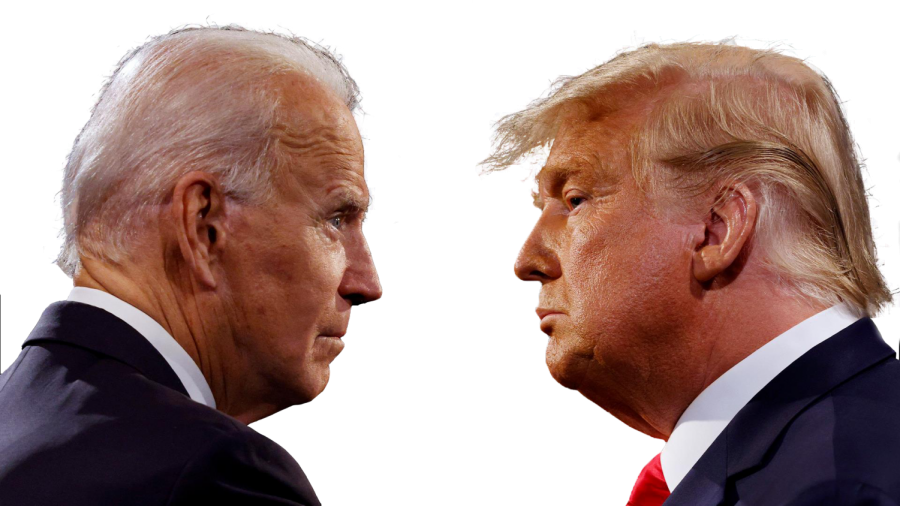The Race to the White House: Meet the candidates
Oct 28, 2020
Election Day is under a week away, but many Americans already have ballots in hand whether it be through early voting or the absentee process. The country is going to be making some tough choices as the day nears, especially in deciding who will take the helm and lead the country in a path toward economic recovery while fighting issues like COVID-19, racial inequity and educational development.
We’ve included candidates that have polled at least 1% in a nationally-accredited poll, which means that in addition to President Donald Trump and Democratic challenger Joe Biden, Liberitarian nominee Jo Jorgensen and Green Party nominee Howie Hawkins are also included. The platforms presented have been determined using college-age polling data to find the issues most topical to our campus community. For more rationale, read our Oct. 19 editorial.
Economic Policy:
Trump
President Trump has his sights set on creating 10 million jobs in 10 months, including 1 million new small businesses. He intends to fuel this by moving jobs outsourced to countries like China back to the U.S. and supporting tax breaks, including the expansion of “opportunity zone” breaks. In his second term agenda, Trump is relying on tax credits to move businesses back to the U.S. while moving away from Chinese dependence. The final leg of his economic policy includes continuing to roll back regulations on energy production.
Biden
Democratic challenger Joe Biden is focusing on bolstering American industry, with plans to pour $400 billion into procurement and $300 billion into research and development to create 5 million jobs over his term. The funding would support industries like artificial intelligence, automotives, clean energy, medicine and biotechnology, especially those in communities of color. Biden stands by a $15 minimum wage, universal paid sick leave, and 12 weeks of paid family or medical leave. Biden plans to support this with an increase of the corporate tax rate from 21% to 28% while vowing it won’t affect those who make under $400,000.
Hawkins
Green party nominee Howie Hawkins has proposed an Economic Bill of Rights, which puts it on the federal government to guarantee: a livable-wage job; an income above poverty; affordable housing; comprehensive health care; lifelong free public education; and a secure retirement.
Jorgensen
Liberatarian party nominee Jo Jorgensen looks at the COVID-19 pandemic as an example of how government and state mandates stood in the way of small business growth. She supports cutting back regulations from government agencies that may stunt business development, including government zoning and licensing laws. Jorgensen wants to limit government spending and taxing.
Education:
Trump
The Trump administration has challenged numerous education policies since 2017. Betsy DeVos, President Trump’s Secretary of Education, opposed a regulation that would have suspended federal funding of for-profit universities, Title IX mandates that required funding for women’s programs and protections for minority students, and the Common Core curriculum. Throughout his 2020 campaign, Trump has emphasized his support for school of choice programs and vehemently opposed the 1619 Project.
Biden
Joe Biden proposes a plan that would forgive up to $125,000 of undergraduate student loan debt and cancel a minimum of $10,000 of student debt per person. He also plans on retooling the Public Service Loan Forgiveness Program and the income-based repayment program in order to reduce or eliminate student loan debt and student loan payments, and enacting legislation that would make it possible to discharge private student loans in bankruptcy.
Hawkins
Howie Hawkins is opposed to forgiving all student debt, claiming that working class students should not pay for the tuition of wealthier students. Instead, he proposes free tuition for all public universities, and instituting a loan repayment program that would allow the government to take possession of the 8% of student loans that aren’t already federal.
Jorgensen
Jo Jorgenson places the responsibility for the student loan crisis on the federal government, and consequently believes the Department of Education should be eliminated, which would remove the government from the crisis, but would also remove Title IX protections and end any regulation of school curriculum.
COVID-19 and Public Health:
Trump
The incumbent president has been vocal about his disdain for Obamacare, as he believes it isn’t good for Americans, and deemed it ‘socialized medicine’ in the last Presidential Debate. While he does not believe that abortion should be legal in this country, he is in favor of the Feds intervening to lower prescription drug costs and end medical billing, but is in favor of the United States leaving the World Health Organization (WHO), partially due to the health guidelines they have advised throughout the pandemic.
Biden
The former Vice President has been critical of Trump’s response to COVID-19, and has proposed a federal mask mandate. Biden is in favor of Obamacare, as he was in office in the Vice Presidential seat when the plan first rolled out. On Thursday’s presidential debate, he hinted that he would want to expand on it, updating the clauses on pre-existing conditions and possibly re-branding it as ‘Bidencare’. Biden believes that affordable health care is a basic human right, as the former VP is pro-choice, wants the feds to intervene to lower prescription drug costs and end surprise medical billing, and is against leaving WHO.
Hawkins
Hawkins aligns with Biden in being pro-choice, and agrees with Biden and Trump on the feds helping to lower prescription drug costs and ending surprise medical billing.Hawkins is in favor of Meidcare for All as a community-controlled national health service and believes the fundamental problem in the current health care system is that it “is designed to create profits for a few rather than guarantee healthcare to everyone.”
Jorgensen
Jorgensen aligns with Biden and Hawkins in being pro-choice, and is against a Medicare for All Healthcare system. While she agrees with the three above candidates in having the Feds intervene with lowering prescription drug costs and ending surprise medical billing, she aligns with Trump in being in favor of the U.S. leaving WHO. According to her 2020 campaign website, she believes “Republican and Democratic policies over the past 50 years are the reason health care has become so expensive.”
Protests, Racial Inequality and Police Reform:
Trump
In his second term agenda, President Trump emphasised supporting the nation’s police, including fully funding them and hiring additional officers. This includes increasing penalties for assaulting officers and treating drive-by shootings as acts of domestic terrorism. Trump also takes a hard stance on eliminating extremist groups (especially ANTIFA) and cashless bail. During a speech in Muskegon, Michigan, Trump repeated his desire for “law and order,” as a response to civil unrest.
Biden
Biden is taking a holistic approach to combating racial inequity, featuring fronts on the economy, education, public health, justice and environmental inequality. Some pillars range from dedicating $150 billion cumulatively to minority-owned businesses and ventures to creating affordable housing opportunities to increase homeownership. This also includes tuition-free education for students attending historically black colleges and universities from families making less than $125,000. On policing, Biden addressed ensuring prisons are reformative and police reform, including judicial oversight and increased community policing.
Hawkins
Hawkins stands by substantial police reform in supporting community controlled policing, which gives power to local constituents who will assemble, legislate and manage their police force. He is also a proud supporter of the federal legalization of marijuana, which is a step toward ending the war on drugs while removing former and future criminal offenses for marijuana use.
Jorgensen
Jorgensen takes issue with the amount of prisoners in the U.S., which she largely credits to the War on Drugs. She supports removing laws that prevent item ownership, from guns to drugs, and would repeal minimum sentences for nonviolent offences and pardon nonviolent criminals. Jorgensen would defund federal involvement in policing as well as the Drug Enforcement Administration.
Environment:
Trump
Over the last four years, the Trump administration has had a hands-off approach to environmental policy, opposing regulations that would require power plants and oil and gas operators to reduce carbon emissions and receive approval for fracking from the Bureau of Land Management. Trump has historically been opposed to the idea of a carbon tax and the Green New Deal as well. He has not placed a strong emphasis on the environment in his 2020 campaign.
Biden
Joe Biden plans on instituting several new organizations, regulations and technologies in order to save the environment, including a new Advanced Research Projects Agency on Climate to reduce carbon emissions and a Civilian Climate Corp that will create conservationist jobs. He also plans on reforming tax incentives to encourage energy efficiency and create jobs in clean energy. Biden acknowledges the strengths of the Green New Deal, and plans on folding the framework it outlines into his environmental policies.
Hawkins
Howie Hawkins’ proposed environmental policies are rooted in his anti-capitalist, democratic beliefs. Hawkins believes that massive, systemic change is required in order to reverse climate change. He plans on restructuring all sectors of the economy so they are better equipped to be ecologically sustainable. Hawkins’ ecosocialist version of the Green New Deal outlines the changes he believes are necessary to protecting the environment.
Jorgensen
Jo Jorgensen’s proposed clean energy strategy is a renewed focus on nuclear power plants, believing that they are the future of environmentally sustainable power. Jorgensen is strongly opposed to energy subsidies, claiming that eliminating them could level the playing field. She is also strongly opposed to the Green New Deal, believing that it will hurt workers and consumers. She says that regarding the environment, the government should provide guidance, not regulations.
Foreign Policy:
Trump
President Trump has imposed tariffs on China, and has said those tariffs will be maintained upon re-election. He is not in favor of the U.S. cancelling or easing our embargo with Cuba, and believes the U.S. should have withdrawn from the Open Skies Treaty, as well as withdrawn troops from the Middle East and Northern Syria in 2019. Trump is in favor of increasing the military’s budget to improve national security. An envoy of Trump has claimed that the U.S. and Russia are ‘very,very close’ to a nuclear deal, but Trump is opposed to re-entering a nuclear deal with Iran.
Biden
On his official 2020 campaign site, Biden called Trump’s foreign policies “erratic”, saying that Trump’s failure to uphold basic democratic principles has surrendered the U.S.’s position in the world. He’s against the tariffs on Chinese trade, is in favor of easing the embargo with Cuba and is against increasing the military’s budget.
Hawkins
Hawkins is in favor of the U.S. remaining in the U.N. to protect U.S. interests in peacekeeping efforts, but wants the U.S. to leave NATO, which he believes is obsolete and should be abolished. He aligns with Biden and Jorgensen in decreasing military spending, as there is a whole section of his website dedicated to rejecting militarism. He is in favor of withdrawing troops from the Middle East, but opposes withdrawing from the Open Skies treaty.
Jorgensen
Jorgensen aligns with Hawkins and Biden on decreasing military spending, and is also in favor of withdrawing troops from the Middle East. Continuing to align with Hawkins and Biden, she is also in favor of re-entering a nuclear deal with Iran, easing the embargo on Cuba, and is not in favor of continuing to impose tariffs in chinese trade.


























